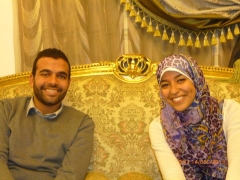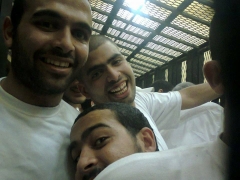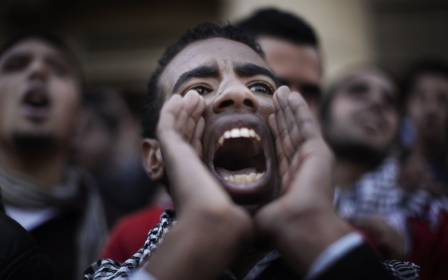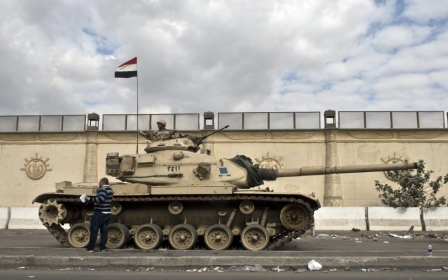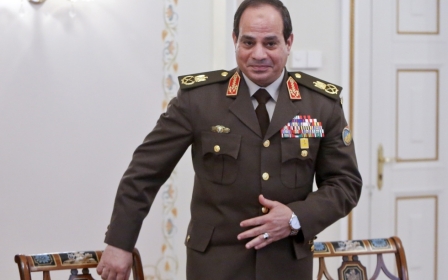War in Egypt's universities
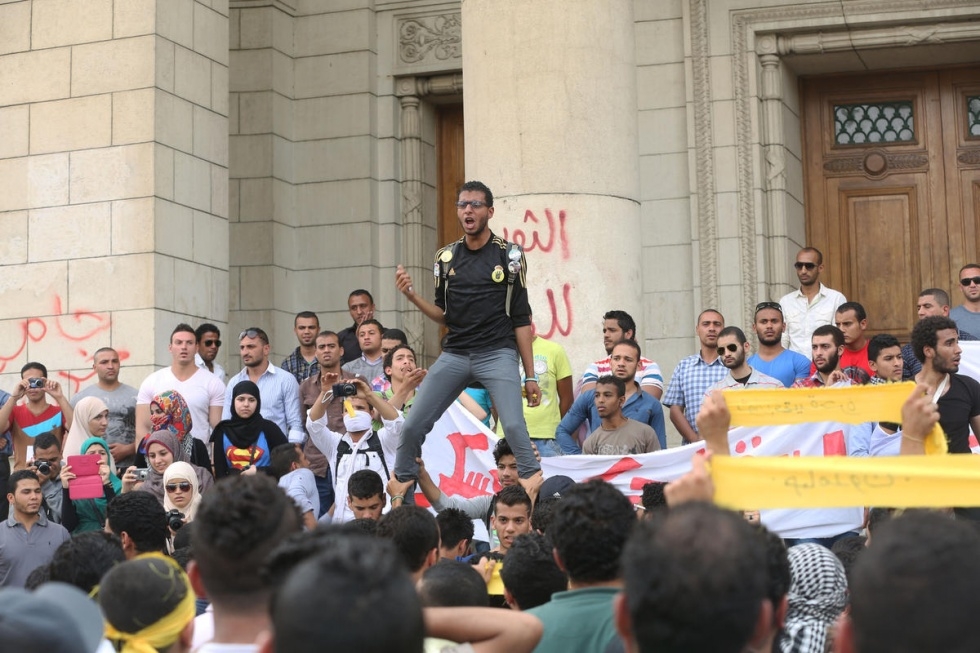
On 16 January, Omar Osama, a Cairo University student, was killed on the university's campus during a protest.
Roughly six hours later, Mohamed Abdel Khalek Mohamed left his home in Giza and boarded Cairo’s metro. Final exams were approaching and he needed to retrieve study materials from his department. In the subway station near the university, Mohamed was stopped by a police officer, arrested, and charged with participating in the killing of Osama.
Two hours later, Salahuddin Mohamed Adly left his work at an upscale hotel in downtown Cairo, and went to search for his friend, Mohamed, after a mutual friend of the two students had called him. When Adly went to the police station, looking for Mohamed, he was arrested and charged for Osama’s death as well.
Now the two young men, still officially enrolled as students at Cairo University, stay in a dark 24 square meter cell in Wadi Natroun prison, roughly an hour outside central Cairo, with 20 other prisoners awaiting trial on similar charges. The prisoners sleep side by side on the bare concrete floor. They have one toilet and a rudimentary kitchen. At night, when the cacophony of the tightly packed and rowdy prison subsides, Adly and Mohamed study for upcoming exams by a weak pane of light filtering through the prison bars.
New MEE newsletter: Jerusalem Dispatch
Sign up to get the latest insights and analysis on Israel-Palestine, alongside Turkey Unpacked and other MEE newsletters
Adly and Mohamed are part of a growing population of prisoners caught in a campaign against Egypt’s increasingly volatile student population. Since the summer of 2013, a sweep of arrests has targeted protesters, organizers, and civilians caught in the crossfire.
Students, activists, and lawyers describe a legal system in which people are arrested for fitting a certain physical profile or simply being in the wrong place at the wrong time, and forced into Kafkaesque trials where little evidence is presented, defense lawyers are impeded at every step of the trial, and core constitutional rights are withheld.
Steadfast student protests
Since Mohamed Morsi was deposed in July 2013, according to Egypt’s Student Union, approximately 2,000 students have been arrested during protests or on politically related charges. The progressively violent government response to protests has pushed families and the older protestors away from the public demonstrations for fear of safety. The government effectively sealed off popular meeting places for protestors, like Tahrir Square and Haram Street in Giza, relegating the marches to Cairo’s suburban areas. Abdul Fattah Al Sisi’s popularity has spread through the country and the protest culture has become a shell of what it once was.
But on Egypt’s university campuses, the protest culture remains steadfast. A Supreme Court ruling in 2011 banned police or military from entering the grounds of any university campus in Egypt and soon students found a venue to protest freely. In recent months, various rulings in different courts have blurred the legal lines regarding the presence of police and military officers on campuses, yet the protests continue.
“Every week they come and [protest],” said a student at Azhar University who spoke anonymously for fear of reprisal from the school’s administration, “and every week police come into the college to stop classes and kick people out.”
For the student body at Cairo and Azhar universities, roughly 200,000 and 400,000 respectively, Monday and Wednesday became “protest days” when protestors gathered on the campuses, chanted and waved flags of their arrested or killed colleagues. Protests regularly turned into clashes, with police firing volleys of tear gas, and sometimes live ammunition over perimeter walls, into the crowds.
“During one of my exams, tear gas got into the room and we all started choking and crying,” the Azhar student said. “How can we learn like this?”
But recently, students and professors say, despite the law that bans them from entering universities, military and police officers have been coming to the campuses frequently, raiding dorms and arresting students.
"There are [plainclothes police officers] wandering [through the campus] all the time. You can know them. They’re watching everyone’s footsteps and watching everyone. It’s obvious,” Ghadeer Ahmed, journalism student at Cairo University and Adly’s fiancé said.
“We all get approached by students who I’ve never seen before and only want to talk about politics. They report what we say to the police,” said the Azhar student who wanted to remain anonymous.
Mass arrest, collective charges
On the morning of 16 January 2013, as a video account of the event shows, a small band of students had gathered for their bi-weekly protests. As the contingent of protestors made its way towards the main gates of Cairo University, riot police clad in plastic protective padding began to amass outside the grounds. Soon, according to eyewitness accounts and videos, the protestors arrived and police began to disperse the crowd.
During the fracas, Mohamed Gamal Nassar, a postgraduate law student and son of the university's president, Gaber Nassar, was injured by shrapnel. “Police entered on invitation of the president,” said a lawyer involved in the case who agreed to speak on condition of anonymity for fear that authorities would interfere with the case.
As protestors scattered, police began to sweep the neighborhood, arresting students and local residents. Two students, Mahmoud Fouad, and Mostafa Ahmed Seif, were arrested while trying to save a female student from being assaulted by police.
Shortly after the event, the Interior Ministry claimed on its Facebook page that violence had erupted before police entered the campus.
"The forces went to Cairo University to control the clashes inside and around campus," said the statement as reported on the Aswat Masriya website.
In total, 42 people were arrested, 13 on campus, eight in a local metro station, and the rest near the university,according to police reports and the lawyer. Most of the arrested were students, but some were simply passing by the metro or campus. In prison, Adly and Mohamed are housed with Yasser, an illiterate 25-year-old mechanic, who lives near Cairo University, and Gamal Allam, a 57-year-old accountant at a state petrol company who was arrested at the metro station. Neither are students at Cairo University. Another defendant was going to report the loss of his wallet and a police officer told him, “'You will stay with us for now’,” the lawyer said.
“Some were arrested because they had a mask. Others with a Rabaa sign. Other arrested because they had a Pepsi can and police said they were using it to wash away the tear gas,” the lawyer added.
Over the past three years, since the revolution, protestors picked up by the police were usually released a day later, and if not, at most in two months. Now, the lawyer explained, detention is indefinite. People arrested in connection with the protests are usually charged with being members of the Muslim Brotherhood, a designated terrorist organization by the Egyptian government, and of being in violation of the protest law which requires all protests to be registered beforehand. For criminal cases, police have a maximum of four days detention before they are forced to present legal charges; with protestors, they have 135 days, the lawyer explained.
“Now, detention is indefinite,” the lawyer said. “When they do this, they are thinking, ‘If we release them, they will go back to clashes, so it’s better to keep them here’.”
Of the 42 students, only two have been released on bail after 48 days in prison, Mahmoud Fouad, and Mostafa Ahmed Seif, one a son of a military police officer and the other the son of a Secret Service officer.
Both Adly and Mohamed, and other students arrested, participated in the 30 June protests to depose then President Morsi. Adly was so much against the Muslim Brotherhood, said Ahmed, his fiancé, that even his friends who were not sympathetic to the organisation thought that he was a bit too passionate in his arguments.
The forensic report, obtained through the lawyer, says the bullets that killed Osama were fired from 2 meters 19 cm, the height of the turret-like trucks often dispensed to quell protests. “Police made pressure to change the report, and it was completely dismissed by prosecution. No weapons were found on anyone who was arrested, ” the lawyer said. “It’s not a matter of law. It’s a matter of the authority.”
Since their arrest, Adly and Mohamed’s friends and family have been campaigning for their release tirelessly. Ahmed travels to the prison almost weekly to bring the two friends food to supplement their meager prison diet. Visits are allotted to 15 minutes.
“They have not been beaten up, but verbally harassed. Guards are not treating them terribly, but mentally it’s difficult,” Ahmed said. Adly had been working at the restaurant to save up money for the couple's wedding. “The day after [his arrest] he was actually going to buy the suit for our engagement party. He didn’t get to buy it,” said Ahmed. “What happened has happened.”
Their case is continuously stalled and delayed by prosecution. “Nothing happens,” Ahmed said. “All this evidence everywhere. Salah and Abdelkhaleq, if they had a fair trial, they would be released immediately.”
- Additional reporting provided by a member of Zeer News, a Cairo-based news agency of freelancers producing articles, analysis, investigative reports, videos and short-documentaries in English, Italian, Spanish and French.
Middle East Eye delivers independent and unrivalled coverage and analysis of the Middle East, North Africa and beyond. To learn more about republishing this content and the associated fees, please fill out this form. More about MEE can be found here.


